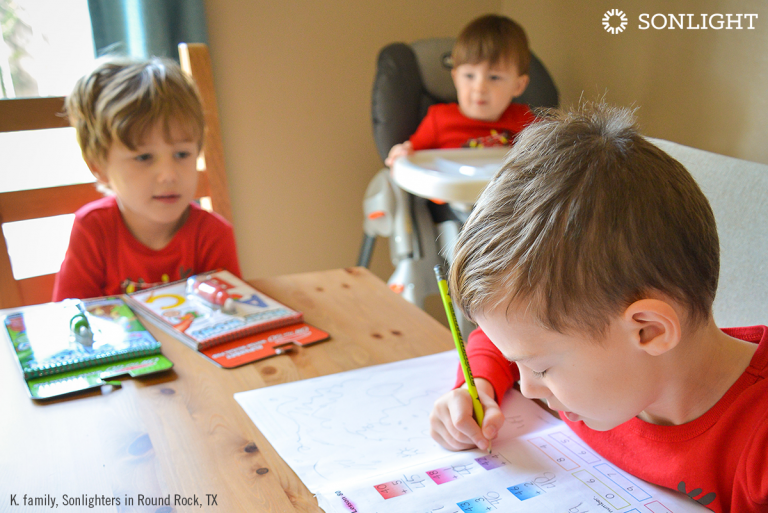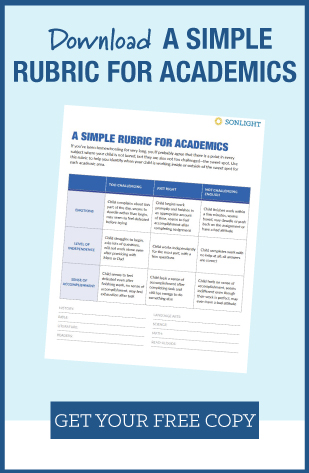“Okay, let’s do the AAR,” my husband said after a church event our family had organized. We gathered in the living room and one by one gave our two cents, down to our youngest child. “I really liked when we sang the songs, and I liked sitting by my leader, but the bounce houses were way too crazy! We need more grown-ups watching the bounce houses.” she stated.
This type of family meeting has become common practice in our home. The term AAR comes from my husband’s time in the military, and it stands for After-Action Review.

The After-Action Review
In the military, after every mission, the soldiers come together and critique how it went. They debrief with questions like
- What went well?
- What needs to improve?
It was clear to us that the practice of constantly reviewing our work is beneficial for multiple areas of life from work to home, even to our ministry at church. We have found it to be particularly useful in homeschooling.
While most public schools are sending out progress reports for the students, I find myself asking my kids for a progress report on their homeschool experience. It's a great way to remind yourself of all you're accomplishing and to ward off that feeling of being behind in school. Here are a few ways that we give our homeschool an AAR.
Enjoy this conversation between Deana, the author of this article, and Stephanie from Sonlight. They talk about giving your homeschool a progress report and making sure your child's school work is in that sweet spot of not too hard and not too easy.
1. One Word Association Game
Every few weeks, we will play the one-word association game. I’m sure that you’ve heard of this. I spill out a trail of words fairly quickly, and my kids tell me the very first thing that comes to mind. It may go something like this…
| You say... | Your child says ... |
| Cats ... | Fuzzy |
| Popsicles ... | Cold |
| Reading ... | Fun |
| Swimming ... | Summer |
| Math ... | Confusing |
This simple evaluation technique gives you a lot of information in a short amount of time. The best part is that your child thinks you are playing a game! Most of the time, the first word that comes to their mind is usually their deepest, truest feeling about each word, so I have found this evaluation method to be pretty accurate.
I make a few mental notes about the words my kids choose and then circle back to discuss it later.
2. Feelings Chart Word Association
This is a more formal variation of the one word association game. In this variation, each child needs a feelings chart. Briefly go over it, explaining any emotion words that they may not know. My favorite emotion charts have faces that help the child to understand the feeling even if they aren’t a reader or don’t know the emotion word yet.
In this exercise, you simply go through a typical day and have your child choose an emotion word for each school subject or schedule block.
3. Listen In…
My girls had the sweetest conversation yesterday in the car. It went something like this:
“I read Hill of Fire today and it was so good! I loved the part about the volcano.” said my youngest.
“I remember Hill of Fire! It was one of my favorites too! Just wait until you get to A Question of Yams! It’s a really good book too. I also really liked The Big Balloon Race. You have a lot of really good books coming up!” exclaimed my oldest.
“I know! I can’t wait to read the one about hot air balloons! I’ve never ridden in one before and I’ve always thought they were really cool!”
“You will love it then!”
That conversation is all I need to know that our reading program is on point.
When your children are actively engaging with the books they read to the point of discussing them with others, you are on the right track! That’s the best evaluation you can get.
So listen in occasionally and see what is making your child tick or causing them to wilt. These organic conversations are one of the best ways to evaluate your child’s schooling, as they are usually very honest with siblings and friends.
4. High/Low
This is a pretty simple evaluation that you can use either on a daily basis or every few weeks. Dinnertime makes the best backdrop for these conversations.
You simply go around the table and have everyone state the highest part of their day and the lowest part of their day. This is a good way to identify struggle areas. Maybe you notice that your child says that science was the lowest part of their day more than once. That's a red flag that maybe you should look into what they dislike about science time.
5. Parent-Child Conference
A spin on the more common parent-teacher conference, the parent-child conference is every bit as important. In a parent-child conference, the parent interviews the child to find trouble spots. Questions may include:
- Out of a perfect score of 5 stars, how many stars would you give our homeschool?
- What is your favorite thing that we do together during school each day?
- What is your favorite subject in school?
- What is your least favorite subject in school?
- Name one thing that you wish were different about our school.
- How can I be a better teacher for you?
- What is the hardest part of our school day?
- What is your all-time best memory of our homeschool? Worst?
- Would you recommend homeschooling to a friend? Why or why not?
6. A Simple Rubric for Academics
There is a point in every subject where your child is not bored, but they are also not too challenged. I call this the sweet spot. A child who is not being challenged will sometimes act out or perform poorly simply out of boredom. A child who is being too challenged will act out or give up because they feel the task is impossible.
As homeschooling parents, we want to find the sweet spot. That's the place right in the middle of too hard and too easy. To do this, you can use this simple rubric for each subject in your homeschool day.
| Subject: _______________ | Too Challenging | Just Right | Not Challenging Enough |
| Emotions | Child complains about this part of the day, seems to dawdle rather than begin, may seem to feel defeated before trying | Child begins work promptly and finishes in an appropriate amount of time, seems to feel accomplishment after completing assignment | Child finishes work within a few minutes, seems bored, may dawdle or push back on the assignment or have a bad attitude |
| Level of Independence | Child struggles to begin, asks lots of questions, will not work alone even after practicing with Mom or Dad | Child works independently for the most part, with a few questions | Child completes work with no help at all, all answers are correct |
| Sense of Accomplishment | Child seems to feel defeated even after finishing work, no sense of accomplishment, may feel exhaustion after task | Child feels a sense of accomplishment after completing task and still has energy to do something else | Child feels no sense of accomplishment, seems to feel indifferent even though their work is perfect, may even have a bad attitude |
Many times, our children are trying to communicate with us when they complain or act out. Most children do not really mean, “I hate math.” What they actually mean is, “I don’t think I’m good at math and therefore, I think I hate it.”
I firmly believe that when kids are in the sweet spot of learning, feeling that little push of challenge followed by a sense of accomplishment, they are truly enjoying their education. I would even say that a student who feels that every subject falls in the just right category is a student who doesn’t hate any subject.
Learning is such a natural thing for a child. It is built into their very make-up, so hating any subject could be an indicator that something is not quite right. If you do find that your child is consistently not in the sweet spot, it may be time to switch curriculum.
A Word of Caution
Please remember that you are asking for honest answers, and these honest answers will not always feel good to your heart. Please don’t take these answers personally. Your child needs the ability to be open and honest with you, so please let them know that in these times, when you are asking them about school, any feeling is valid.
It’s also okay to hear their honest answers and not change anything at all. Remember, you are the decision maker, and ultimately, you know what’s best. However, simply giving your child a safe space to share his feelings has value in itself.
Asking for and valuing our children’s opinion of their school experience not only helps us make informed decisions about curriculum and schedules, but it helps them to know that they have a voice in their own education. There is power in knowing that your thoughts can help change the way things are. It is my prayer that this simple practice of AAR will translate to even bigger opportunities for their voices to be heard in the future.










Food for thought. It helps to read between the lines of how our kids are trying to not tell us something that we really need to know. Thank you.
Deana, this is such good advice. Thank you for sharing this!! I will definitely use some of these ideas.